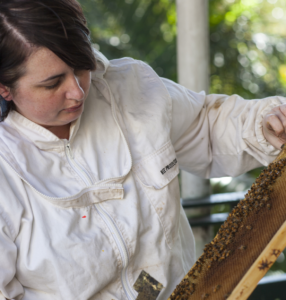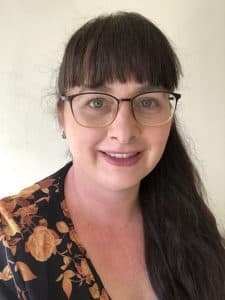Budding cotton scientist set on creating a crop that can cop heat-stress
Wednesday, 21 April 2021
Plan Bee researcher profile: Dr Nadine Chapman
Plan Bee is a national genetic improvement program using innovative breeding technologies to transform the performance of honey bees in Australia. The project team are located throughout the country and are experts on everything from genetics, entomology and beekeeping practices.
As the nationwide program rolls out, we will introduce key members of the team to understand more about the people driving this program forward. In this researcher profile, we introduce Dr Nadine Chapman from the University of Sydney, lead researcher on the Plan Bee program.
Tell us about your career background:
As part of my PhD undertaken at the University of Sydney, I discovered that queenless colonies attract workers from other, mostly queenless, colonies and that these interlopers produce more offspring than the workers that belong to the colony.
Following my PhD studies under Dr Ben Oldroyd, I made a brief foray into stalk-eyed flies before returning to the University of Sydney. Here I largely worked on industry driven projects such as creating a genetic test to pick up Africanized bees in quarantine and determining if queens produced early or late in the season have enough mates.

How did you get involved in bee research?
I had planned to work in microbiology, however I took a subject with Ben Oldroyd that included a lot about bees. Learning how the relationships within the hive drive their behaviour was fascinating and beautiful and caused me to change my plans. These days I enjoy the satisfaction of working on projects of intrinsic value to society; we need our bees to secure our food. I enjoy working with different stakeholders and trying to understand their needs and finding ways to meet them.
What does a typical working day entail?
There is no such thing as a typical working day for me. I spend most of my time chatting with beekeepers and poring over the feedback they provide on the Plan Bee program via surveys and workshops. As the program evolves, I will spend more time in the field, meeting beekeepers face to face.
You can also find me in the BEE (Behaviour, Ecology and Evolution) lab at the University of Sydney. Here, using our state-of-the-art molecular lab and bee house, we combine genetics with the work we undertake in the field.
And of course over the last twelve months, I have spent a lot of time on Zoom collaborating with our other team members and beekeepers across the country!
What is your role in the Plan Bee program?
I have been consuming all the literature on bee breeding around the world (around 700 articles!) to help ensure we apply these lessons to the Australian context and make the program the best that it can be.
I engage with stakeholders, both in the beekeeping industry and within pollination, to assess their needs, seek their guidance in developing the program and to create the tools needed for the program’s success.
I collect data with the team at NSW DPI on the DPI breeding colonies and in crops to determine if there are traits related to pollination that can be included in breeding programs.
Finally, I oversee the genetic testing aspect of the program.

What is your vision for Plan Bee?
My vision for Plan Bee is greater security and prosperity for beekeepers and those that depend on them. Selection will result in more productive, less diseased bees and provide a framework for selection of Varroa resistance traits, should the mite become established in Australia.
I’m excited to be involved in implementing the techniques that have unleashed huge progress in various Australian livestock industries. Those industries have benefitted greatly from added focus on genetics and the power of having a large database of records and tools to guide selection. It’s also incredibly exciting that individual queen breeders will be able to select their own stock for the traits that their customers are interested in.
Ultimately, I want a sustainable queen breeding program that is driven by the needs of industry.
How can interested beekeepers or queen bee breeders reach out to you?
Any beekeepers who want to find out more about the program can reach out directly to me:
Dr Nadine Chapman
| 02 9351 2267
Facebook:
@sydneybeelab
@ProfessionalBeekeepers
Latest News
-
Budding cotton scientist set on creating a crop that can cop heat-stress WORKFORCE AND LEADERSHIP / 21.04.21
WORKFORCE AND LEADERSHIP / 21.04.21 -
Essential tools and proactive biosecurity measures for sustainable Sea Cucumber industry growth EMERGING INDUSTRIES / 21.04.21
EMERGING INDUSTRIES / 21.04.21 -
New workforce strategy for Australia’s $8 billion+ chicken meat industry CHICKEN MEAT / 21.04.21
CHICKEN MEAT / 21.04.21 -
‘One-size-fits-all will no longer suffice’: AgriFutures Australia reveals new revenue opportunities for rural industries NATIONAL CHALLENGES AND OPPORTUNITIES / 21.04.21
NATIONAL CHALLENGES AND OPPORTUNITIES / 21.04.21






